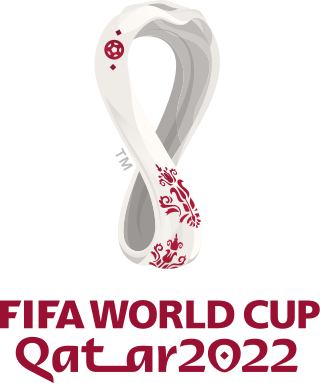
The 2022 FIFA World Cup was an international football tournament contested by the men's national teams of FIFA's member associations and 22nd edition of the FIFA World Cup. It took place in Qatar from 20 November to 18 December 2022, making it the first World Cup held in the Arab world and Muslim world, and the second held entirely in Asia after the 2002 tournament in South Korea and Japan.

This article summarises the results and overall performances of Australia at the FIFA World Cup.
The FIFA World Cup, sometimes called the Football World Cup, but usually referred to simply as the World Cup, is an international association football competition contested by the men's national teams of the members of Fédération Internationale de Football Association (FIFA), the sport's global governing body. The championship has been awarded every four years since the first tournament in 1930, except in 1942 and 1946, due to World War II.
The FIFA World Cup is an international association football competition contested by the men's national teams of the members of Fédération Internationale de Football Association (FIFA), the sport's global governing body. The championship has been awarded every four years since the first tournament in 1930, except in 1942 and 1946, due to World War II.
The men's football tournament at the 2006 Asian Games was held from 18 November to 15 December 2006 in Al-Wakrah, Al-Rayyan and Doha, Qatar.
Group E of the 2019 AFC Asian Cup took place from 8 to 17 January 2019. The group consisted of Saudi Arabia, Qatar, Lebanon and North Korea. The top two teams, Qatar and Saudi Arabia, advanced to the round of 16. However, third-placed Lebanon missed out qualification to the knockout stage by fair play points to Vietnam.

The 2019 FIFA Club World Cup was the 16th edition of the FIFA Club World Cup, a FIFA-organised international club football tournament between the winners of the six continental confederations, as well as the host nation's league champions. The tournament was hosted by Qatar between 11 and 21 December 2019, taking place at two venues in Al Rayyan.

The 2020 FIFA Club World Cup was the 17th edition of the FIFA Club World Cup, a FIFA-organised international club football tournament between the winners of the six continental confederations, as well as the host nation's league champions. The tournament was hosted by Qatar.
The 2020 AFC Champions League group stage was played from 10 February to 4 December 2020. A total of 32 teams competed in the group stage to decide the 16 places in the knockout stage of the 2020 AFC Champions League.
The 2020 AFC Champions League knockout stage was played from 26 September to 19 December 2020 in Qatar. A total of 16 teams competed in the knockout stage to decide the champions of the 2020 AFC Champions League.

The 2021 FIFA Arab Cup was the 10th edition of the Arab Cup, the Arab world's national team football tournament; it was the first edition under FIFA's jurisdiction. It took place between 30 November and 18 December in Qatar, as a prelude and test event to the 2022 FIFA World Cup which was also held in Qatar.

The 2020 AFC Champions League Final was the final of the 2020 AFC Champions League, the 39th edition of the top-level Asian club football tournament organized by the Asian Football Confederation (AFC), and the 18th under the current AFC Champions League title.
Group A of the 2021 FIFA Arab Cup took place from 30 November 2021 to 6 December 2021. The group consisted of hosts Qatar, Iraq, Oman and Bahrain.
Group B of the 2021 FIFA Arab Cup took place from 30 November 2021 to 6 December 2021. The group consisted of Tunisia, the United Arab Emirates, Syria and Mauritania.
Group C of the 2021 FIFA Arab Cup took place from 1 to 7 December 2021. The group consisted of Morocco, Saudi Arabia, Jordan and Palestine.
The knockout stage of the 2021 FIFA Arab Cup was the second and final stage of the competition, following the group stage. It began on 10 December with the quarter-finals and ended on 18 December with the final match, held at the Al Bayt Stadium in Al Khor. The top two teams from each group advanced to the knockout stage to compete in a single-elimination tournament. A third place play-off was also played between the two losing semi-finalists.
The 2022 AFC Champions League knockout stage will be played from 18 August 2022 to 6 May 2023. A total of 16 teams will compete in the knockout stage to decide the champions of the 2022 AFC Champions League.

Group D of the 2022 FIFA World Cup took place from 22 to 30 November 2022. The group consisted of reigning world champions France, Australia, Denmark and Tunisia. The top two teams, France and Australia advanced to the round of 16. Australia, Denmark and France were also in Group C of the previous World Cup.

Group H of the 2022 FIFA World Cup took place from 24 November to 2 December 2022. The group consisted of Portugal, Ghana, Uruguay and South Korea. The top two teams, Portugal and South Korea advanced to the round of 16. Uruguay exited the tournament after failing to progress the group stage for the first time since 2002, with South Korea's shock 2–1 victory over Portugal contributing to the elimination.
The knockout stage of the 2022 FIFA World Cup was the second and final stage of the competition, following the group stage. Played from 3 to 18 December, the knockout stage ended with the final, held at Lusail Stadium in Lusail. The top two teams from each group advanced to the knockout stage to compete in a single-elimination tournament. There were 16 matches in the knockout stage, including a third-place play-off played between the two losing teams of the semi-finals.







